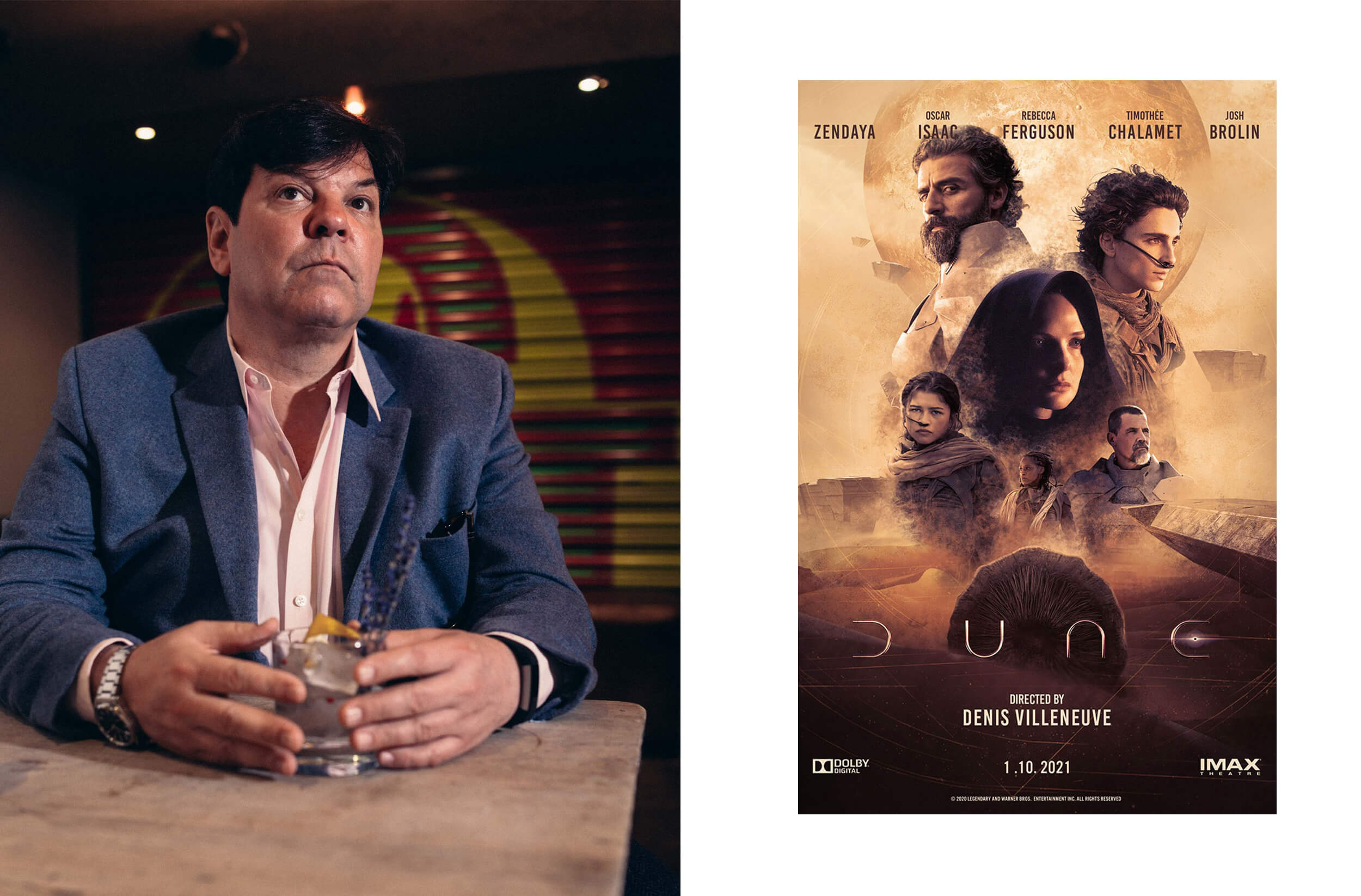We’ve had two interviews with Donald so far on The Italian Rêve: the first time, on the occasion of his BAFTA nomination for his work on “Blade Runner 2049,” and the second time, for his once again masterful job on “First Man.” In other words, this man never stops surprising us and this time, once again, he left us speechless and breathless for his head makeup designer work on his latest movie, “Dune.”
However, with Donald, it is never only just an interview: with him, we also discuss pauses, reflections, the beauty of making it and the fear of failing, the adventures he lives, and the challenges he can face on his way. Not to mention the fact that Donald has always been a great mentor, helping the new generation of makeup designers all around the cinema world find their way, sharing precious tips that are very rarely and hardly shared.
This time, we focused on his work on “Dune,” the latest movie directed by Denis Villeneuve (“Arrival,” “Prisoners”) that’s sweeping the whole world. Right here, together with Villeneuve, with whom he’s worked a lot in the past, with a wonderful cast and a unique team, Donald found the inspiration, the strength, and the ideas to fit in and be the piece of a puzzle that made everything simply perfect.
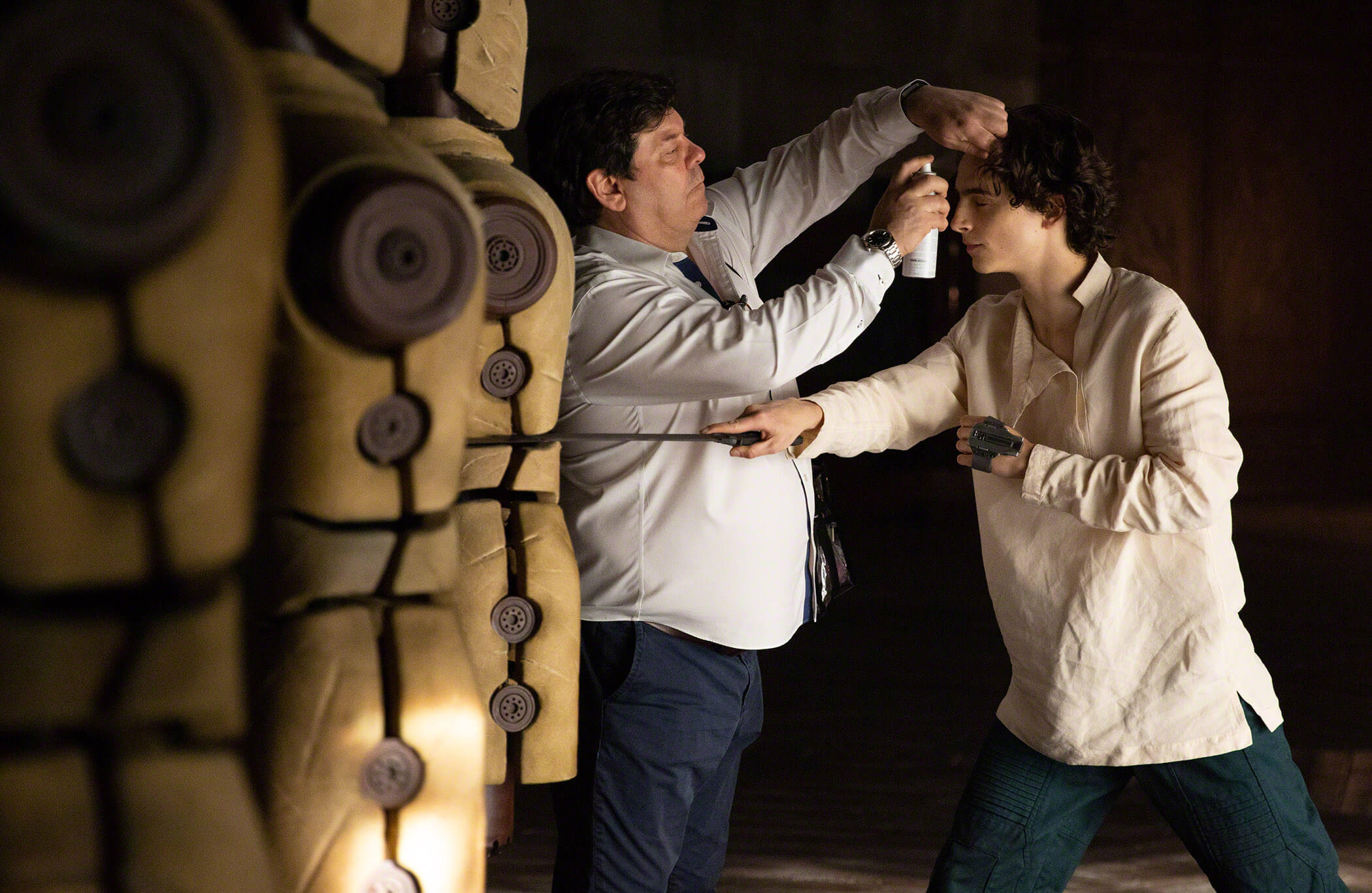
The last time we met in LA, we talked about “Dune,” and you told me it was “HUGE.” What was it like to work again with Denis Villeneuve, and with this huge cast?
It’s incredible – I can’t believe I did it. I feel like I got struck by something, and the gods, or whatever that’s out there, said, “Do this one, and it’s going to be really good.”
For me, Denis brings some kind of magic, working with him, Patrice [Vermette], the costume designers, who were the amazing Bob Morgan and Jacqueline West, and with Greig Fraser shooting it, and Joe Walker, the editor, it felt like when everything is perfect. And that doesn’t happen very often, not even in the nicest jobs. We had Gergley [Galisz] and Paul Lambert at the visual effects, and they’re my friends, too, which made a big difference, I really liked the people. We worked very hard on “Dune,” I’m very proud of that.
We finished it in August two years ago, 2019, and in August 2019 I felt very different than I do now because of Covid – I’m amazed we’re not all crazy, I’m amazed that we’ve all tried our best, everybody I know – and for me, personally, I think it was the big transition because the first year I went back, when I was sick, was the summer of 2018, and “Dune” brought me back in my head. I was very depressed, sick, I didn’t feel good about a lot of things, so “Dune” brought me back creatively and made me go, “Wow, I’m very lucky I have this second opportunity to come back and to do this huge job that will be very stressful;” a lot of people say you should avoid stress, but I live on it! Now, two years later, I feel like it was a big accomplishment because a lot of people were like, “Should you really take such a big job?” and I’m really glad I did.
I think it was important for me.
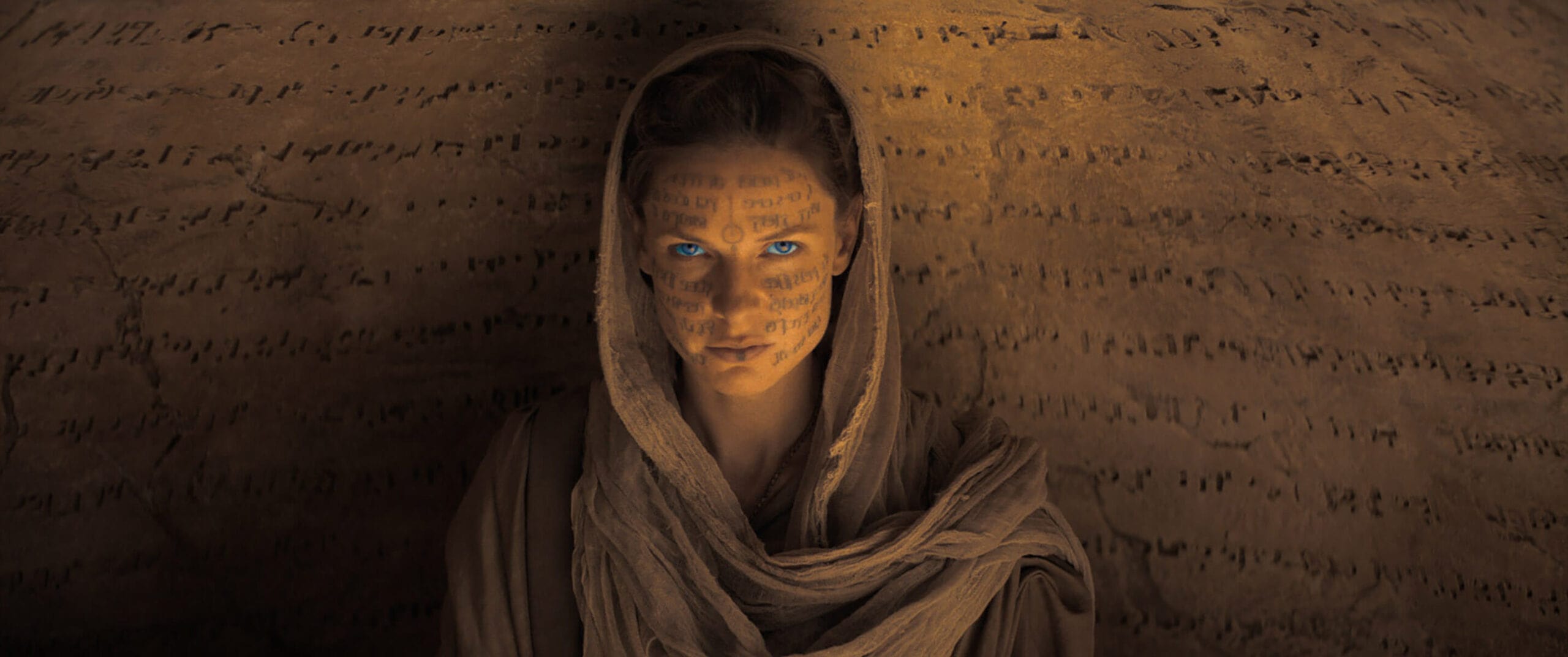
Every character is so different, and I know you worked with Villeneuve, of course, to understand how to work on every single one of them. What was it like for you to create so many different characters? Was there something that you added, creatively, in their making?
Firstly, when I work with Denis it’s a little bit different than with other people because we have a relationship now where I kind of know that he’s going to send me a lot of visual references that he’s sending also to the costume and production designers, so we’re all in the same atmosphere, in the same world initially. So, he would send me ideas, like the Sardaukars, we had lots of ideas about the Bene Gesserit, Charlot Rampling, we had ideas about the Harkonnens, but at first, everything is very general and broad, you start with just one big idea. I think we started very quickly to go in on the family, on Timmy [Timothée Chalamet], Rebecca [Ferguson], Josh Brolin, Oscar Isaac, and what they are in their world. Rebecca’s character is beautiful, she’s a concubine, she’s young as the wife of the duke and a little bit young for the mother of Timothée Chalamet, but actually, she’s quite perfectly the age; so, making her look real and authentic, beautiful, ethereal, natural, but still, “do you believe she’s the mother of Timothée Chalamet?”, we had to be very careful. I had to give her makeup and hair that made her a little bit more statuesque, a little more perfect, a bit more Grace Kelly, that was my idea for her. For example, when she goes into the stillsuit, she suddenly looks like a girl, she’s fit, she’s fighting, and the duke, as well, we had to age him, and the beard; so, we talked about every character and what I would do and – I always do this with Denis – I start in our office with pictures of each actor that I have, and I build a file: I start pulling fashion magazines, anthropology, films, cutouts, clips, and I build a file and start to move it like a puzzle.
I look at it as a fashion magazine, really.
For example, Josh Brolin, the scar: is it going to be here, or here? We had things about a hockey player who had a big accident with a skate across his face, we tried bleach blond hair, all with photoshop; then I go to Denis for my first or second meeting and show him everything I have, and he looks at it. I kind of know when he thinks I’m crazy, and other times he’s like, “I get it, talk more,” sometimes he says, “Let’s just brainstorm,” and there are other times I know that he will never love it, never ever. My first makeup design for Javier Bardem, he thought it looked like “Pirates of the Caribbeans” because we had longer hair, the beard, and we put on eyeliner; he said, “We can still put the eyeliner, it just needs to be a different look.” So, once we had the great costumes by Jackie and Bob, that had a middle-eastern influence, and I gave him the dark makeup, the black liner and the tattoo, then it looked good, and he loved it. So, everything’s a process. Also, for some of the characters, we had no camera test, like Javier Bardem, Chen Chang: they arrive, you do the makeup, the hair, the costume, and they shoot. With Javier Bardem, I did a test one day before, with Zendaya, no test, just one phone call, one photograph, and “See you tomorrow morning!” [laughs]
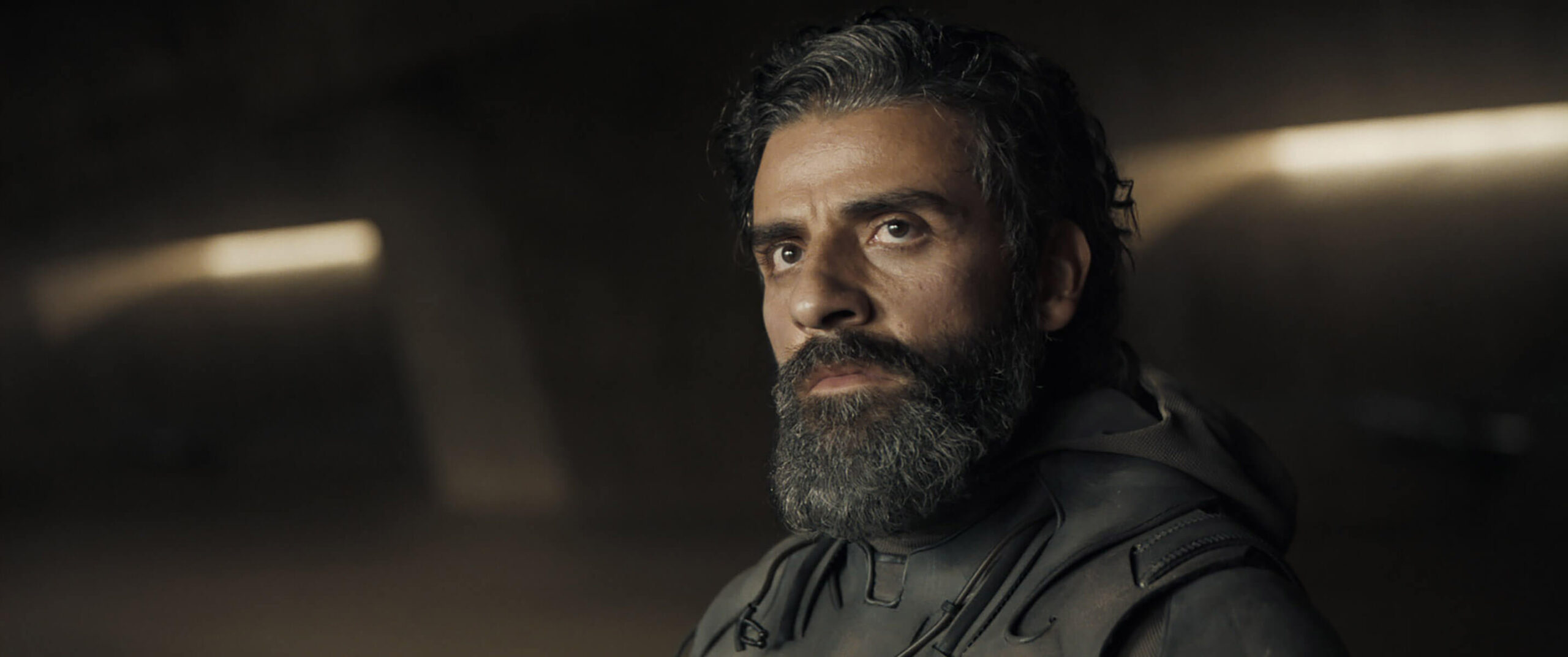
“I always do this with Denis, […] I build a file and start to move it like a puzzle.”
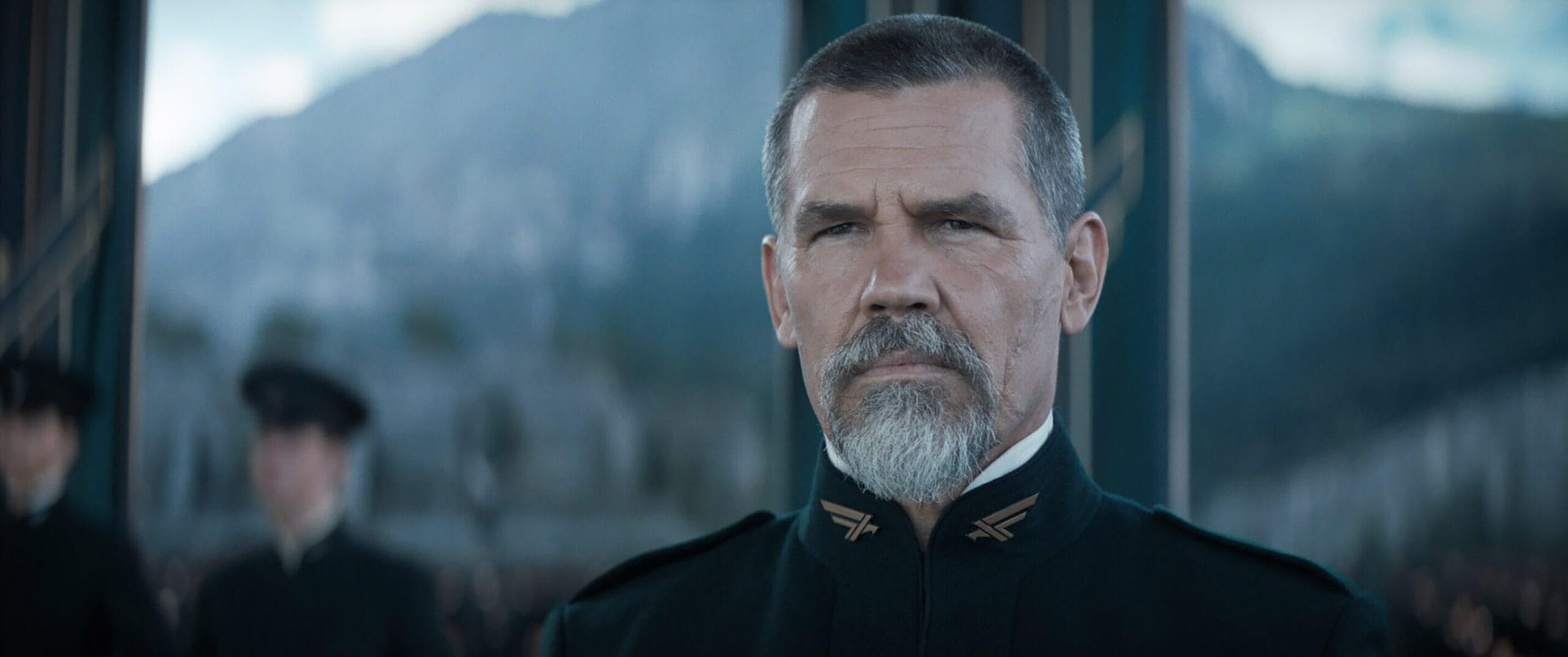
What about Stellan Skarsgård? I think he said his makeup took 8 hours!
5 and a half hours actually… [laughs]
Denis and I talked about it, we hadn’t figured out which company, what makeup effects, etcetera, but he wanted me to be in charge of it and design the principal concept. Then I heard who the actor was and started to get an idea, I had a couple of names in my head as I would have had to hire a team to build that makeup because it’s a fat suit. I met with Tanya [Lapointe] and Denis in Santa Monica, one day, just to figure out a couple of things, and he said, “You need to think of this as an experiment, it may or may not work, I trust you, come up with something,” and I said, “To me, the Baron is Marlon Brando in two films: ‘Apocalypse Now’ and ‘The Island of Dr. Moreau’,” where he’s got the white makeup on, “That’s my idea.” Also, Cardinal Richelieu of New France in Quebec, where Denis and I are from, so I knew he would know what that meant, and a couple of cartoon characters. I thought this could be interesting, so we started. The very first concept I did for Denis was, as he said, “a gorilla-like man,” a man with a big chest and a big face and neck – but it has to be scary, and sometimes fat is funny, as I said to Denis, “it can be very funny like that, so you have to really be careful, and you also need to be respectful, you’re not fat-shaming other people” because it’s okay to be fat and we were very careful about that, so I said to him, “Let’s try.”
We saw a couple of ideas and then I had an epiphany: “my friends Love Larson and Eva Von Bahr, who worked with me before, are in Sweden, they know Stellan, they have a makeup lab in Sweden, I’m going to be in Budapest, this is perfect;” so, I phoned them, I pitched them to the studio, they’re not as well-known makeup effects artists, but they’re phenomenal and they work a lot with me, so I sold it, I really pushed it and sold it to Joe Caracciolo, Denis and Legendary. Suddenly, I had a big lump in my throat, I thought, “Oh my God, what have I done?” and Love said, “Oh my God, what have you done? I have a lump in my throat,” and we decided to start prepping, and so we did. We talked every day, once a week we did a concept and I sent it to Denis; he would say, “I have to say, with the first one I could see everybody got nervous, this is maybe not going to work,” there was fear on everybody’s face, but I said, “It’s a growing pain, it’s a hiccup.” So, we fixed that really quickly and, as it progressed, I said, “Let’s get Stellan in, let’s do a live cast.” We were shooting already, but luckily, we were not going to shoot Stellan until the very end of the schedule of the film, so we had many weeks to prep. Love and Eva and four or five people sculpted, they did the live cast, a makeup test on Stellan, they sent it to me, we went through it, we made changes before I sent it to Denis, and then we showed it to Herbert [W. Gains] and everybody at Legendary, and they loved it. Then, we brought Love to Sweden, we did a stunt double, Eva came, the whole team came, and we did a makeup test on Stellan on camera for Greig Fraser, the DP…
…and the rest is history.
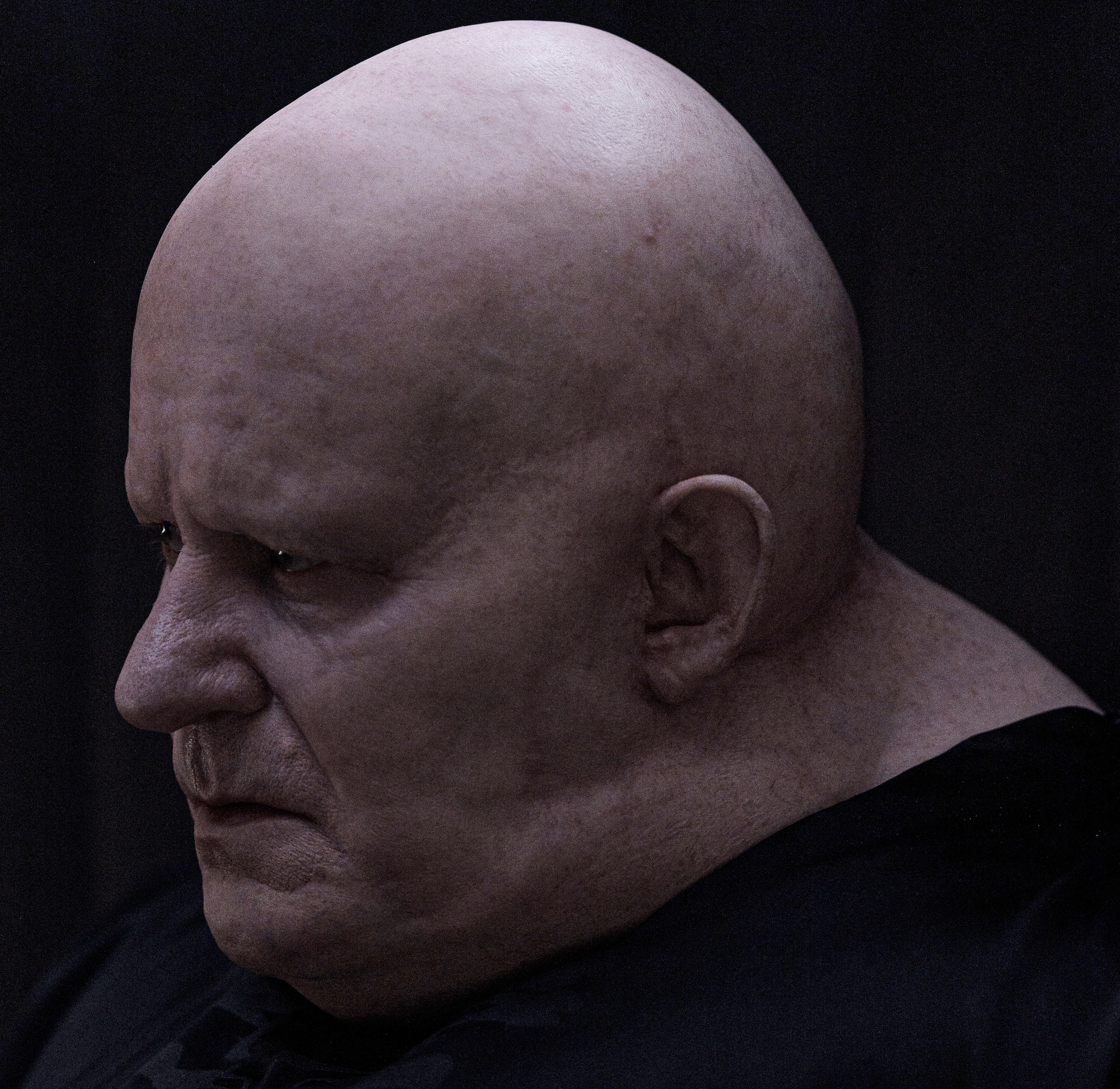
Really, great job!
What was the most challenging moment or character to conceive, makeup-wise?
It’s funny because you’d think it would be the Baron, and on a certain level it was, but the thing is, with the Baron, you know it’s makeup, everybody knows, and he’s kind of naked, and there are a lot of moving pieces, a lot of people, five people to do that makeup.
We worked over five/six days in the whole film, and I had a team of phenomenal people, I would like to say everybody’s name if I can: Jo Mac Neil, my key makeup, Rocky Faulkner, my effects makeup artist, Cheryl Daniels, my head hairstylist, Jennifer Stanfield, who did makeup and hair for Jason Mamoa, Ama Arful, Kata Husza, Balasz Silk, Kornel Hidas, my hairstylists, the Baron makeup crew, and, for the bigger crowd sequences, additional hair, makeup and prosthetics artists from Europe, UK, USA and Canada; then, of course, Love Larson (designer Baron) Eva Von Bahr (key Baron), plus their crew, Oskar Wallroth, Mathias Tobiasson, Hannah Holm, many great makeup specialty suppliers, and Charlotte at Paul Edmonds London. Also, huge thanks to our crew during pick-ups during the height of Covid… So many people helped me look good, so many people came for two weeks to help.
The hardest makeups were the Harkonnens, Dave Bautista and David Dastmalchian because they all had to be bold and white, with no eyebrows. It was a lot of work.
Dave Dastmalchian was supposed to shave his head and this is the true story: he was going to shave his head and maybe even his eyebrows, and I said to him, “no no no, we can do the eyebrows with makeup, with a prosthetic cover,” but then he got another movie, “The Suicide Squad,” so he couldn’t shave his head and we had to do the bold cap, so I had to go to Denis and explain that he couldn’t shave his head because we were going to do something with him with hair, so that was eliminated. Dave Bautista never really has hair, so with him, we had an easier chance, but he’s so powerful looking and because he’s been in so many films with makeup, like “Guardians of the Galaxy,” I thought, “why don’t I make it kind of beautiful, stylish?” and I think he does look sort of beautiful with this light face and brows, it’s a little bit like the play “Mephisto,” it has a vibe of that, and it’s theatrical, quite smooth and perfect, so that’s what we did. They all look a little bit different, so Dave Dastmalchian is wearing a bold cap and eyebrow covers, Dave Bautista eyebrow covers but no bold cap (his head is shaved). I would say that was the most challenging and where I had to have the most amount of makeup artists because we had so many backgrounds and crowds.
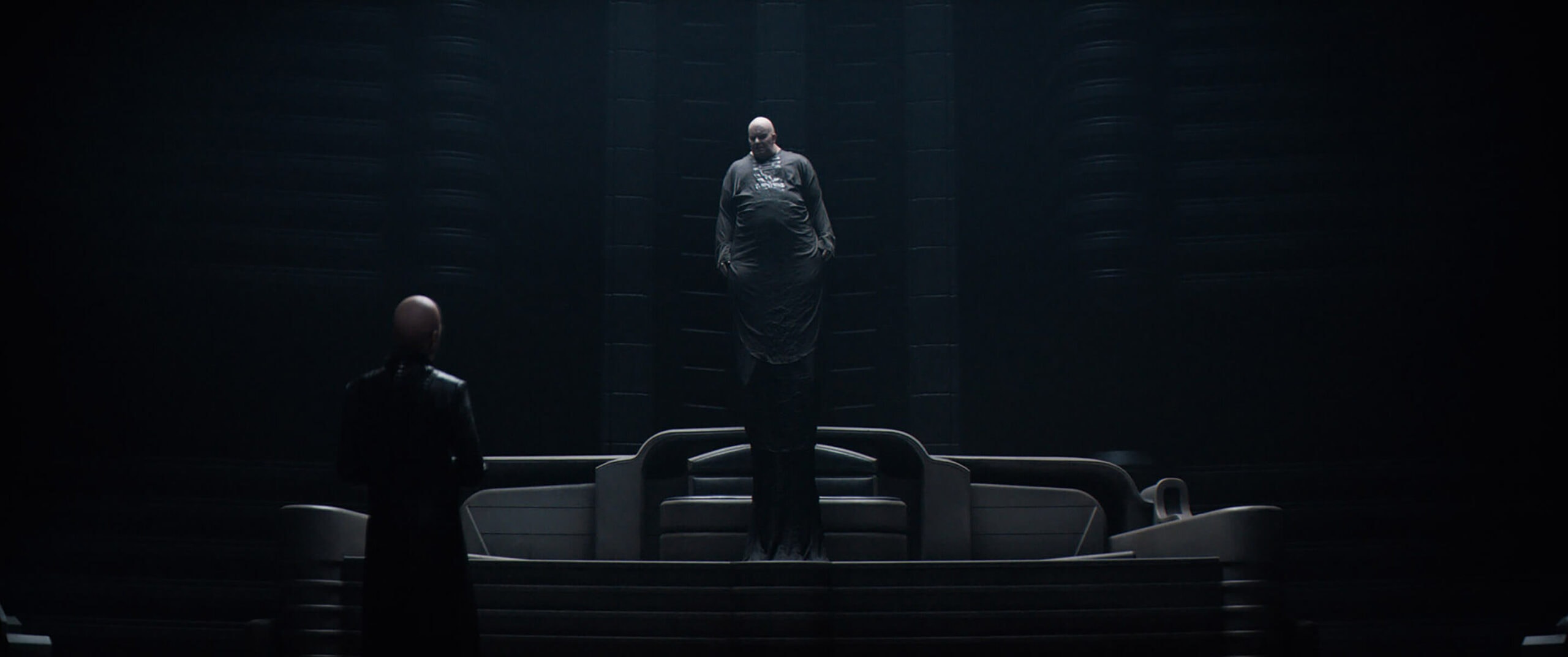
“…I had a team of phenomenal people…”
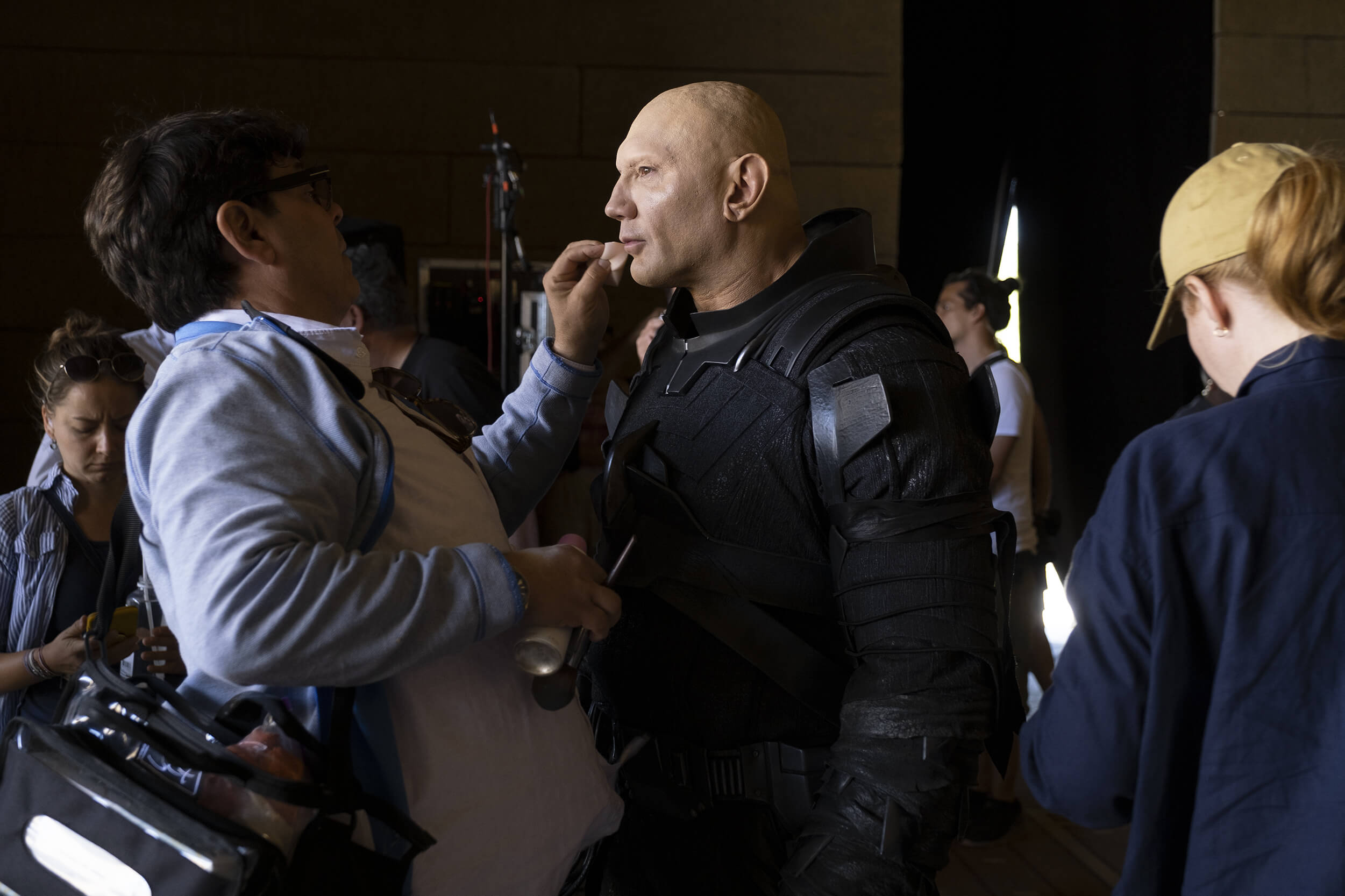
Do you like doing sci-fi movies? We’ve mentioned before that you do a lot of movies about real people and you love it, movies where makeup is not the protagonist, but it’s still so important, even though many people don’t realize that because it’s subtle; but then, you do this movie, which is so different, but it’s also fun, right?
It’s really fun! I used to love to think I would like to still work on period films, but now the more I look at period films, the more I think how beautiful the work they do is, they really recreate a period beautifully. Last year, I really loved “Pinocchio,” I loved what they did, what Mark Coulier did, every makeup, every costume, every hair, the little Pinocchio, everything was unbelievable – it was period, it was prosthetic, it had everything, so, for me, it was a perfect makeup film, I have never seen a makeup film like that in many years. Now, to come to “Dune,” I thought, “Wow, I never thought about sci-fi,” but it’s funny because, when I was young, maybe I did like sci-fi because I really loved Margaret Atwood, and she’s a sci-fi writer, “Cat’s Eye,” “The Handmaid’s Tale,” I loved all of her books; then I thought, “Maybe there is something in that for ‘Dune’” because I love basing things: some of it is Medieval, some are futuristic, and I think it borrows a lot from period, it’s a little futuristic and quite modern, so I love the genre very much.
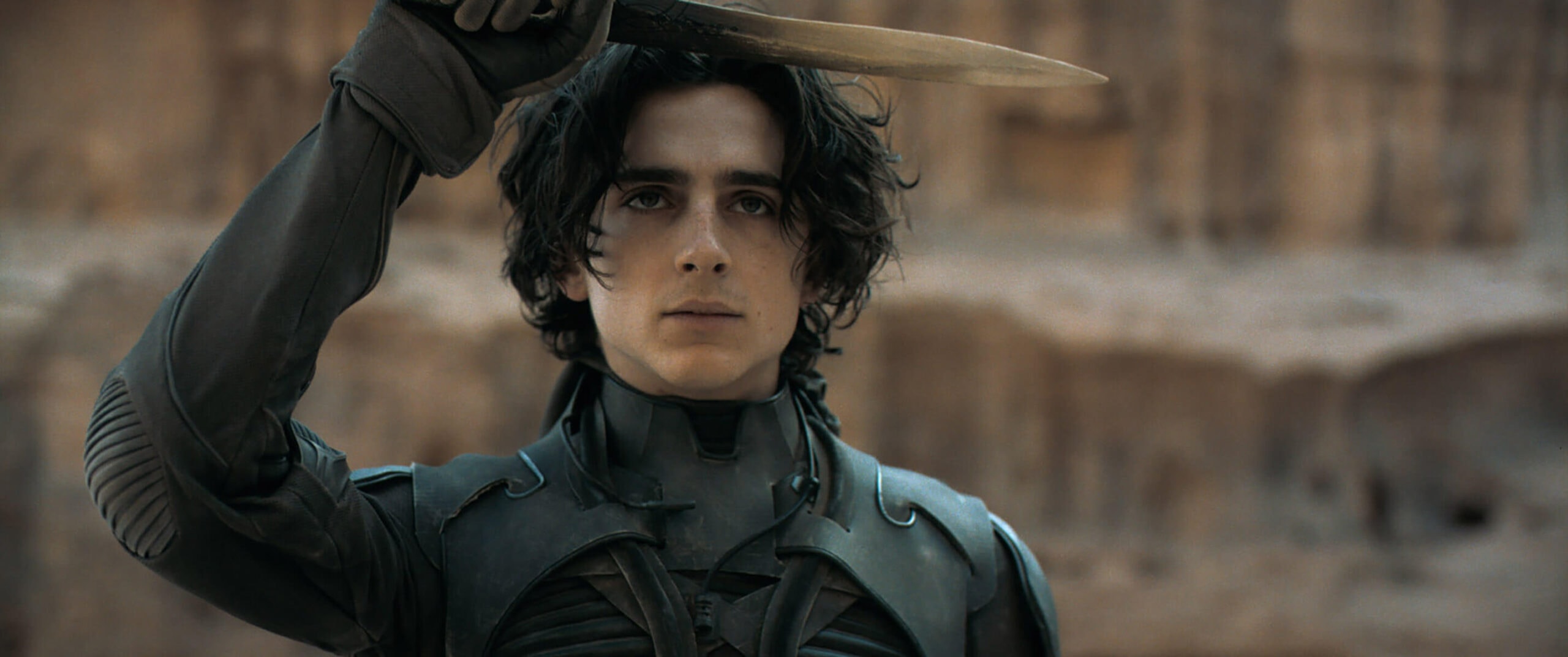
“Dune” also tackles several important and very current themes, such as climate change. What role do you think this powerful and eloquent story plays in today’s reality, not only from a literary point of view but also considering the climate emergency we are all witnessing?
I think we’ve been seeing this for a long time, and I’m not an expert, I’m just a makeup man, but look, we’re all responsible, we all have to help, and educate ourselves, listen to the experts, the scientist and the specialists.
As for “Dune,” when I was there, I remember thinking, “We’ve touched on everything,” whether it is the oil crisis, the shortage of water, which we understand – I live in California, and I understand – and also the shortage of freshwater when you come from a place like Canada, where I do not understand why certain people in certain communities don’t have freshwater, and everybody is guilty of this. I’m from Canada, which is the second-largest country in the world with the most resources, and we still have issues of clean water for indigenous people, it’s a fact and it’s been a fact for many, many years. I think that “Dune” has a message that is very important. When I had safety concerns about filming – because that happened since of Covid, I had concerns about being safe on set –, I said to one of my assistants, “You need to watch a movie by John Schlesinger called ‘Day of the Locust,’” and they said, “I’ve never heard of it,” and I said, “It’s not that old, it’s from 1975, but I think you should watch it because it’s all about films and how dangerous it is, and how the work is dangerous, and how we don’t always listen to the caution we’re told.”
I think that any film that sends a message that keeps us aware and helps narrate a story about something terrible, like Covid, infection control, poverty, and the few people owning the clean air and water – and this is all that this is about, isn’t it? –, is kind of frightening.
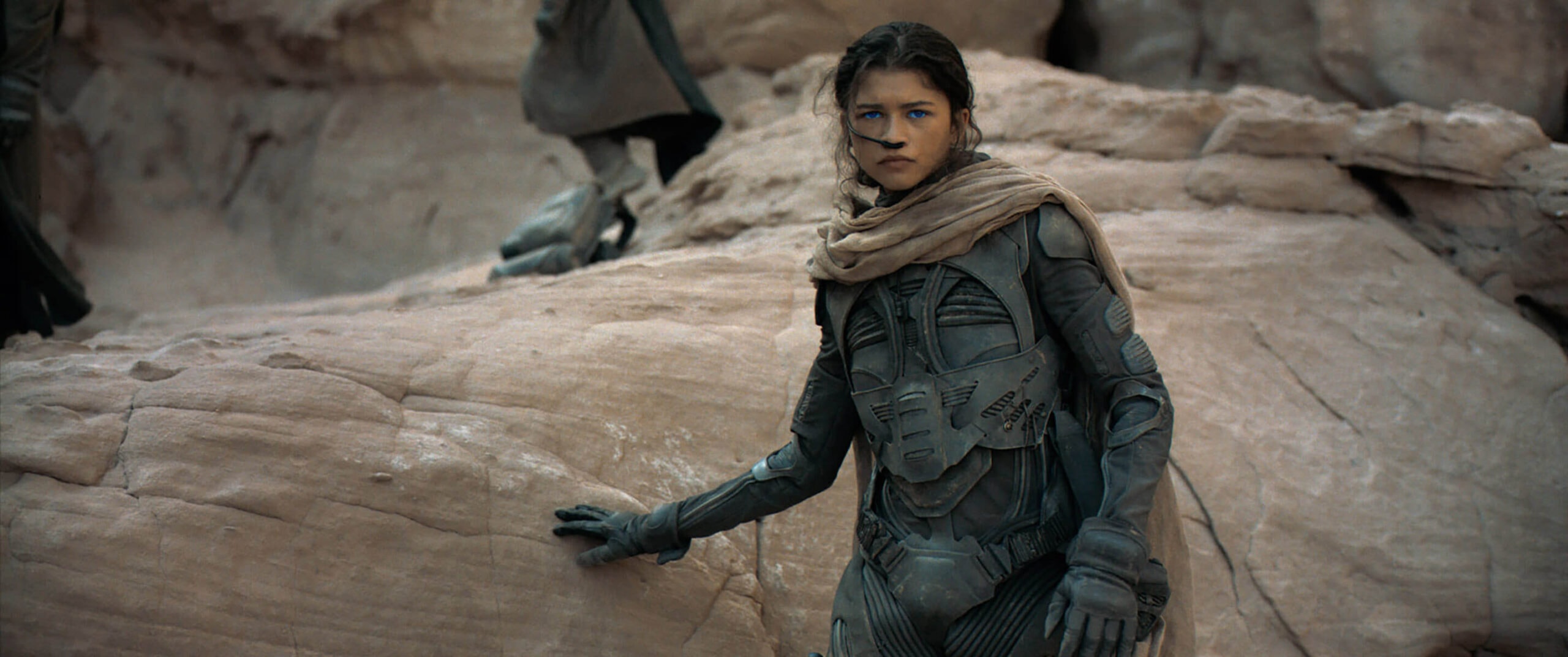
“We’ve touched on everything.”
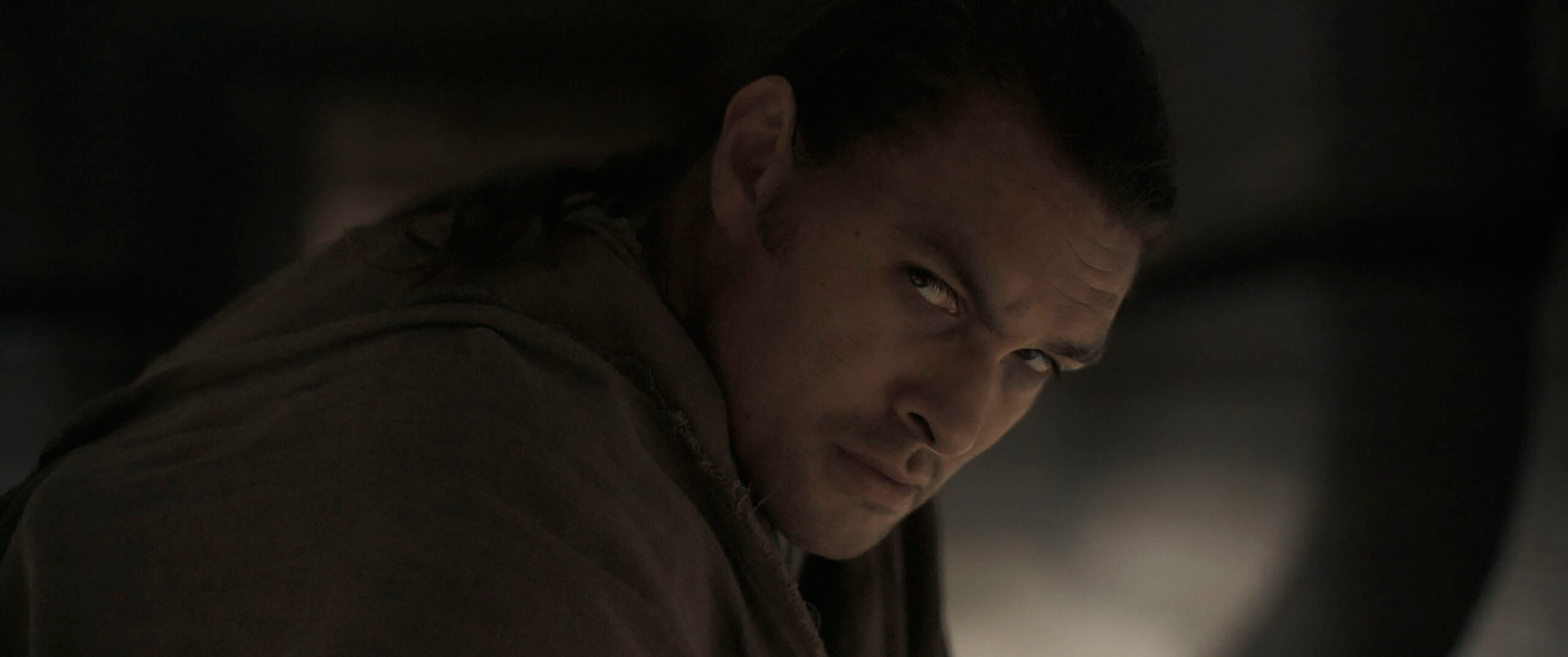
Yes, and we’ve lived in a movie over the last year and a half, so…
Right. When it started, I thought this would be six months, then I thought maybe a year… When I went back to work, it was because we had additional photography and pickups on “Dune,” a year after we wrapped the film, in July 2020 and we went back with the masks, the visors, and we did it. I have to say it was very hard to recreate all the characters with wigs and beards, Oscar Isaac and Josh Brolin came back with short hair and a short beard, so we had to recreate the looks. It was very hard work, but I loved seeing everybody. It was kind of a nice way to regroup, but then it delayed again and again, for TWO years.
I think all of us out there deserve a huge break, all of us who kept going, just for keeping going, I think, we really did something remarkable. At the same time, it’s been hard for us, but it’s been harder for a lot of other people, and I look at myself and think, “I was able to work, I didn’t starve, I didn’t get kicked out of my home,” so I just want to remind people that not everyone had that story. For me, it feels like Covid made me angry because I realized very quickly, and I knew this would happen, that the people who have hurt the most are hurt the most, the poor, the disenfranchised, the sick, the elderly, and the young who are going to school but don’t go to school and still pay the school fees. It hurt all of us, but I think that what bothers me the most is that some people did well, the Covid companies, the testing companies, the drug companies, they did really well! It’s so infuriating, and I have to say that, going back to work, the Covid people at work never made me feel they were out for our safety, they were just there so that they could keep working; nobody thought about us, and I’ll say it because I feel like, apart from our reshoots on “Dune,” I didn’t feel safe on a lot of jobs, I didn’t feel like they really cared about what would happen to us. I was very troubled because I did all kinds of things for the Union, for BAFTA, for the Academy, for the IATSE, I participated, I tried to engage and work with young people, have hope and beliefs, but also be angry and push back because a lot of us weren’t pushing back at the Covid people on set, we weren’t pushing back that we’re losing jobs and they’re hiring people with no expertise to be Covid specialists on the set. That’s laughable. It made me so angry, honestly, I really want to come back one day and say: a lot of people did not treat us right through this.
It was a really hard time, and it made me know who my friends are, that’s for sure.
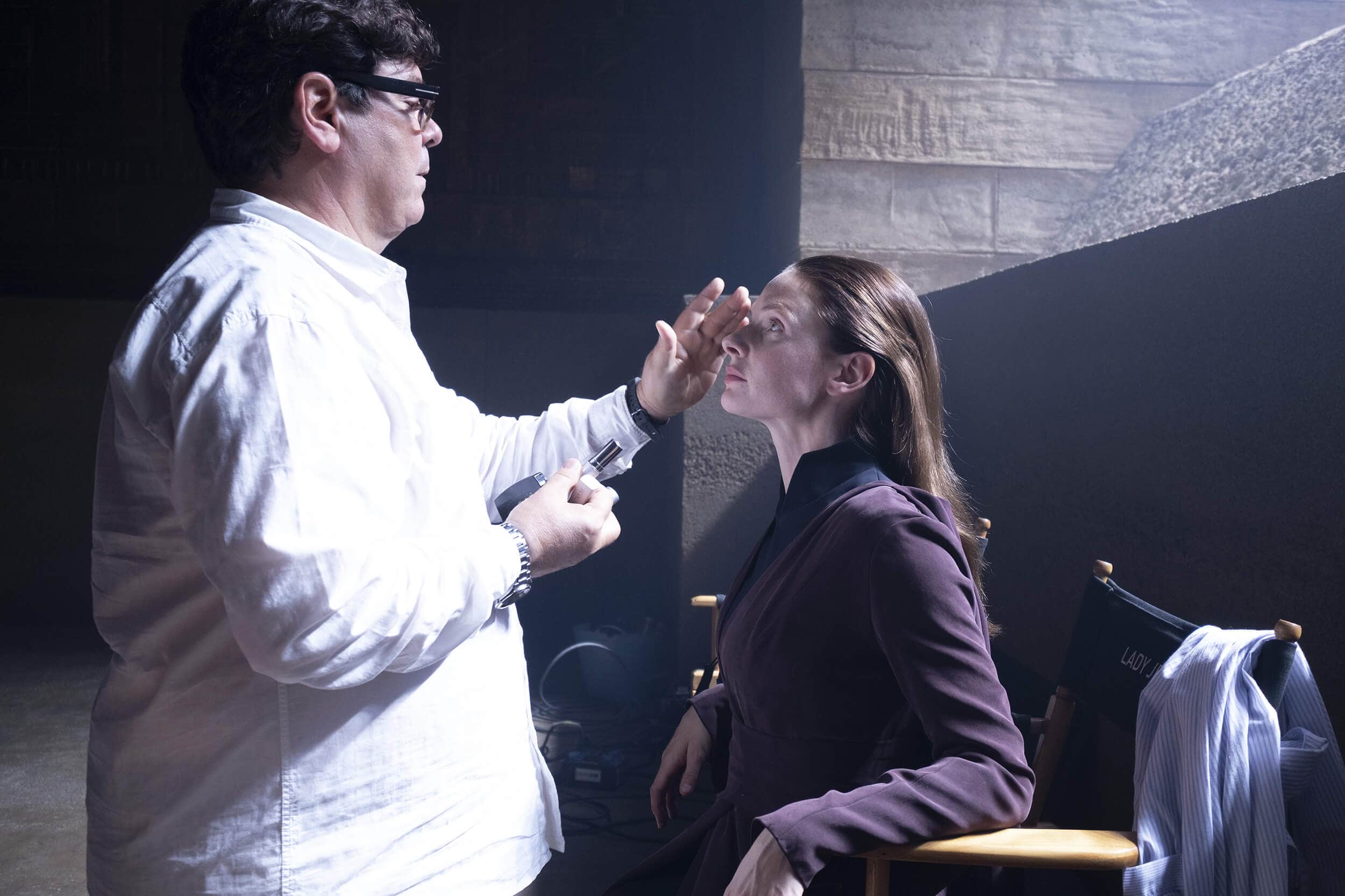
At least you know now.
I love our chats because we also try to speak about mental health. About “Dune,” you said that you weren’t in a good place before it. When you were filming, did you have a routine or something that helped you stay focused and healthy?
It’s a strange thing to say to someone, but I really had tremendous clarity on that film. With “Blade Runner” I did too, but there was a lot happening on other levels. On “Dune,” I knew that I was making choices, I had maybe a few glitches with my team or a couple of people that might have been problematic, but I think you realize that you have a moment in your life where you go, “Everything’s worked out perfectly, I’m here, I’m alive, I’m doing the job I meant to do with the director I meant to work with;” creatively, I feel that Denis trusts me, but he also challenges me to do good work and I want good people to help me do that good work; but surely before, I know I didn’t feel great. It’s not a secret, I didn’t feel great for about a year, in my head maybe, physically, emotionally, I didn’t feel good for most of 2018, and in 2019 I was disappointed, I was troubled by a lot of things, my health concerns.
Now, and it’s very important for me to mention this, the people you work with are not always your friends, sometimes it’s just business, but Timmy Chalamet brought so much joy to me when I worked on the film; the first time that I met Timmy, I spent an hour or two with him, then I met with Rebecca [Ferguson], I talked to Josh Brolin on the phone, I met Javier Bardem in Budapest, we did a little makeup test, little things; I knew Javier a little bit from the Bond movie, I knew Josh Brolin from “Sicario,” with Rebecca, the minute we started talking, we clicked instantly, and I knew they were trusting me because they trust Denis Villeneuve, and it became “do what he tells you to do” and I really felt that they believed that. I thought, “I’m with the best people.” With Timmy, we had so much fun, even in Jordan, every Sunday, he would call me up and we’d go and have a club sandwich and sit outside by the pool, just us, nobody else, and we’d just have a great time and talk – I think because I’m older, I feel like he’s my child, it’s a beautiful relationship. Rebecca is so easy to talk to, and she wants to be good, but it’s not about vanity, so she used to say to me things like, “Look, we need to maybe go a little bit like this and try that because you might look too pretty like this if your hair is in this way,” and she was very trusting and I’m really thankful for that.
Every single actor of “Dune,” everybody that came through brought this positive energy, nobody came in negative, no one came in contradicting, nobody came in with a chip on their shoulder. It’s rare to say it, but it was a perfect cast.
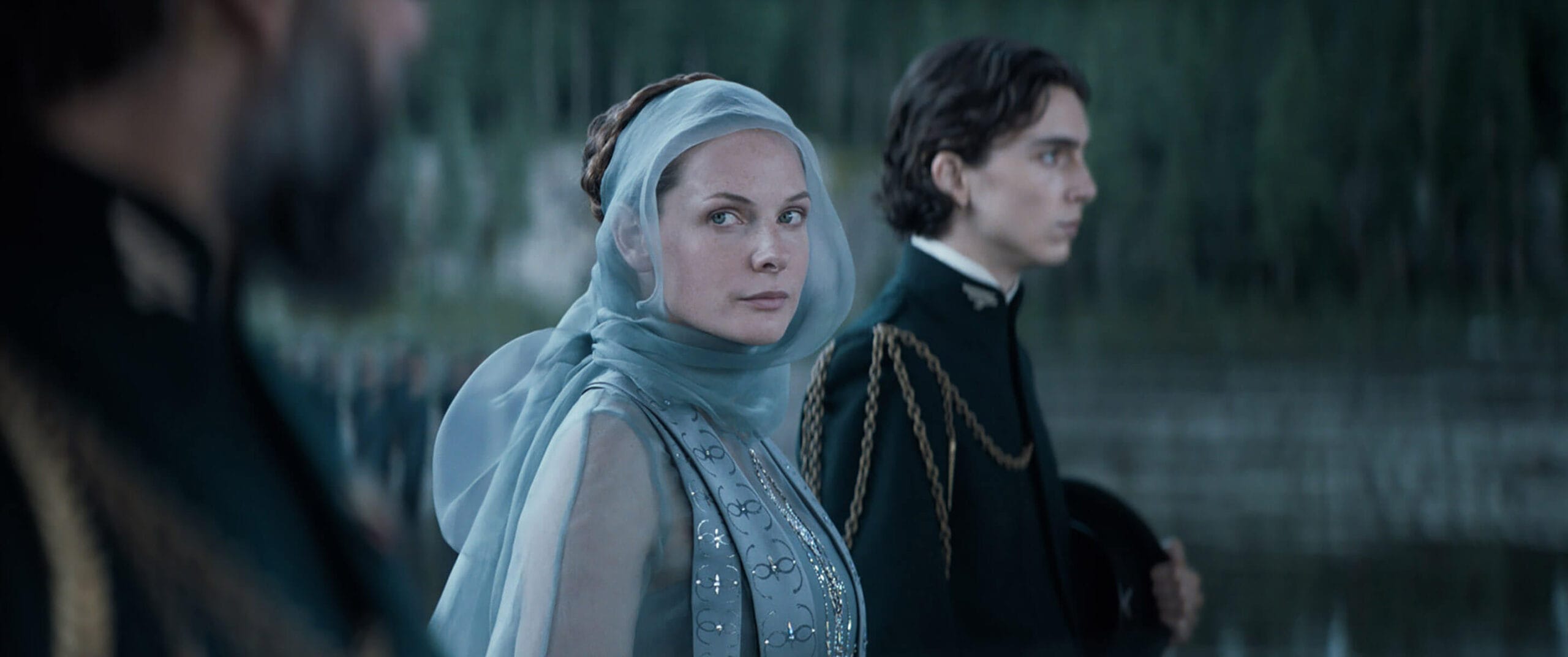
“It’s rare to say, but it was a perfect cast.”
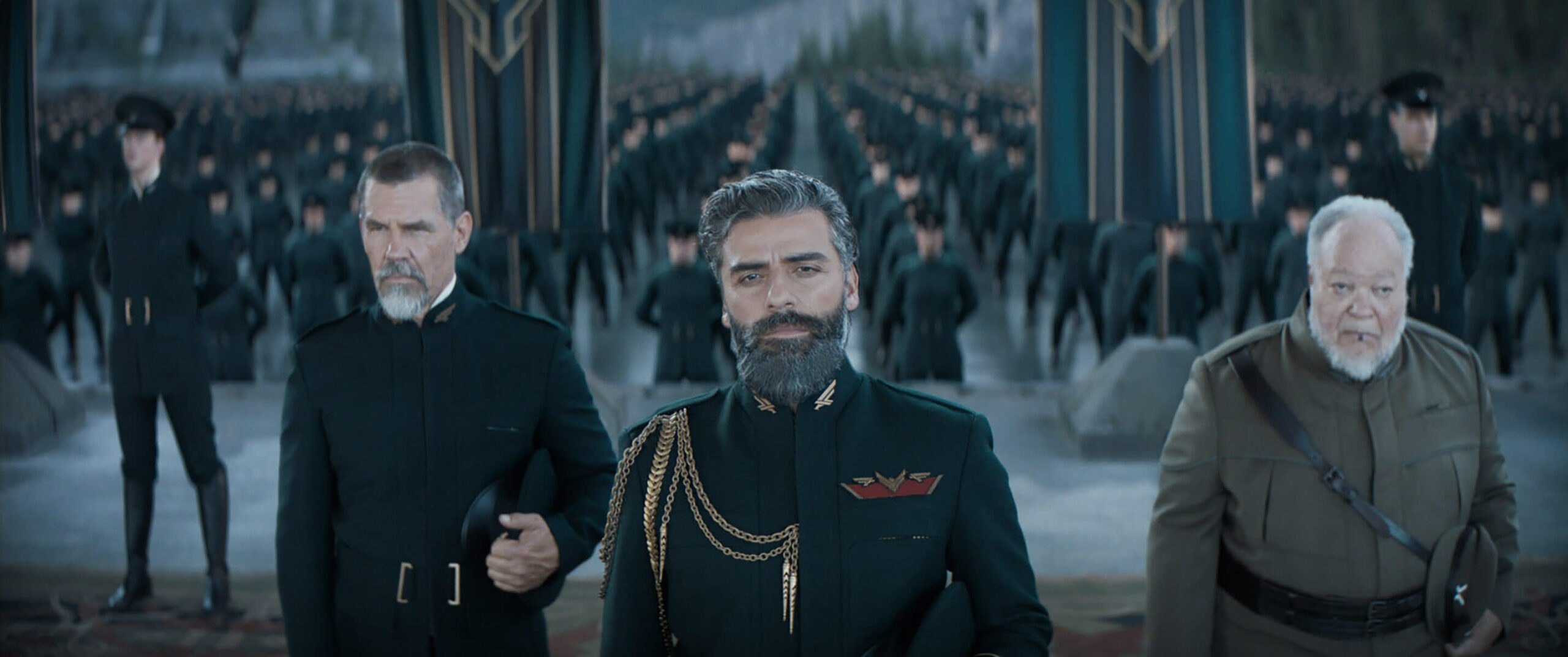
You were in the right place with the right people.
Right place and right people, and then it’s been two years, exactly, and I felt a little bit emotional, but I really realized I got a two-year mark after my health crisis and my emergency, it was exactly two years. By the time we finished “Dune,” I thought, “Wow, I’m really lucky I’m alive and I did this, and I completed it, I’m in good shape,” and I went right into another movie. I went back to LA and I started “The Little Things” with Jared Leto. I had an amazing time, I love Jared, and I loved to finish one film and go into another, I had a great year, and I was very lucky.
I’m so happy for you. I’m sure that everyone will see the joy with which you’ve done your on “Dune,” and you deserve so much.
I hope so. It’s hard right now, but better days are ahead, we’ve gone this far, we can keep going.
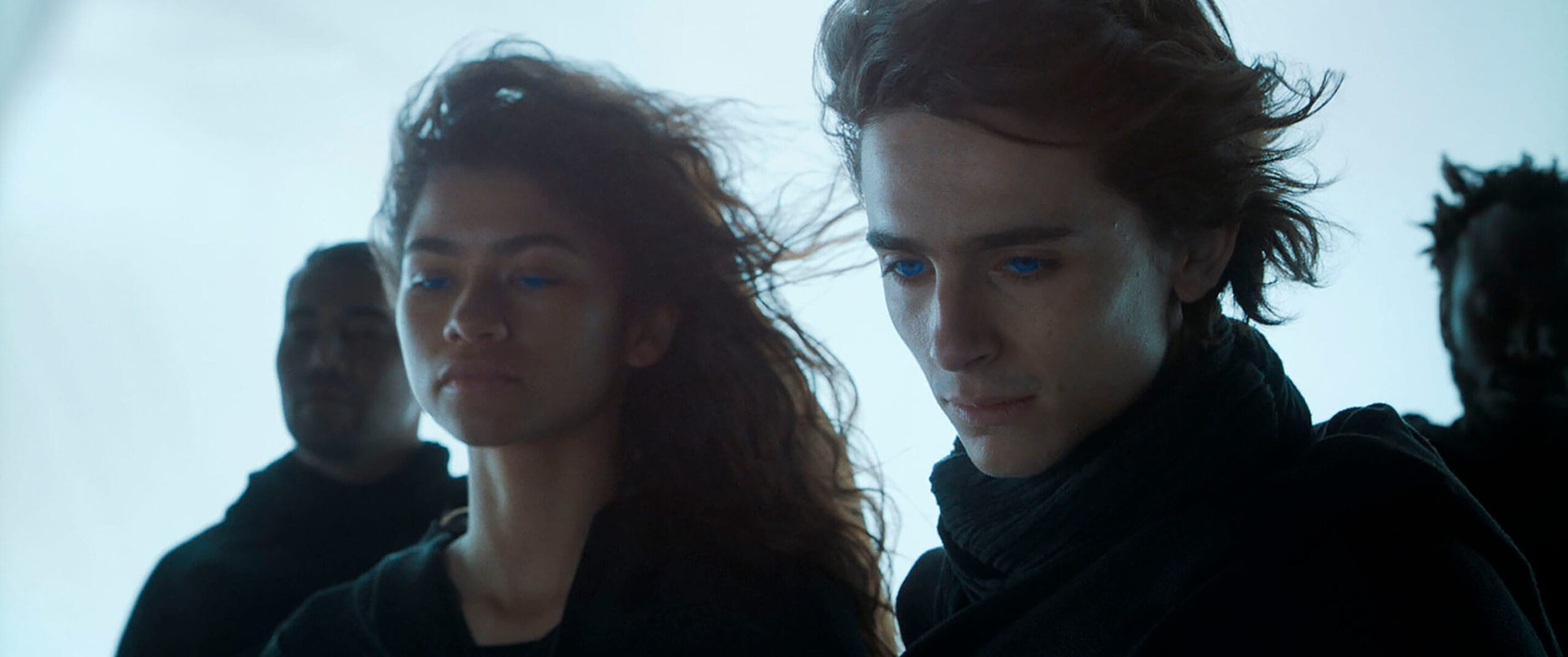
Credits images to Warner Bros.

